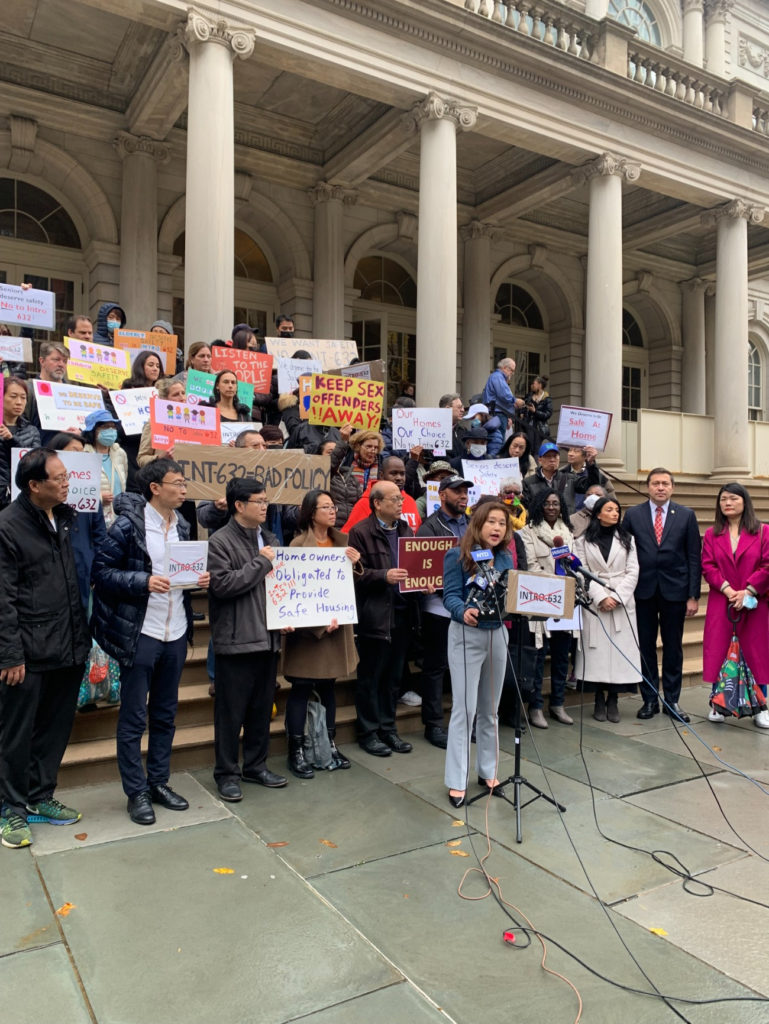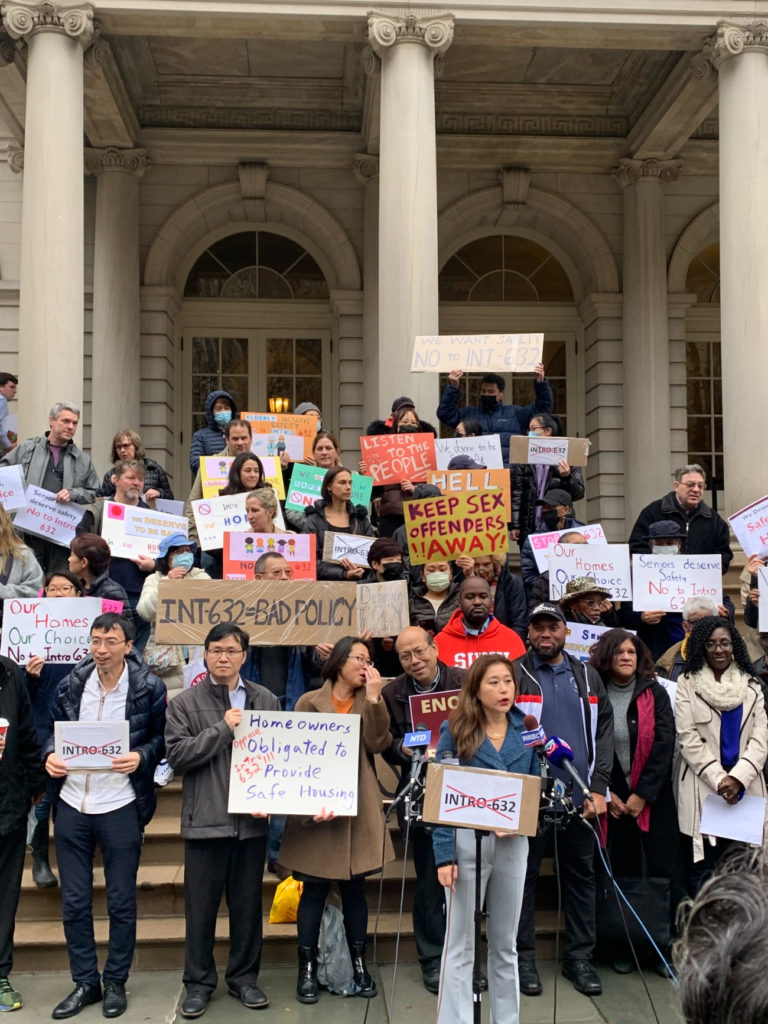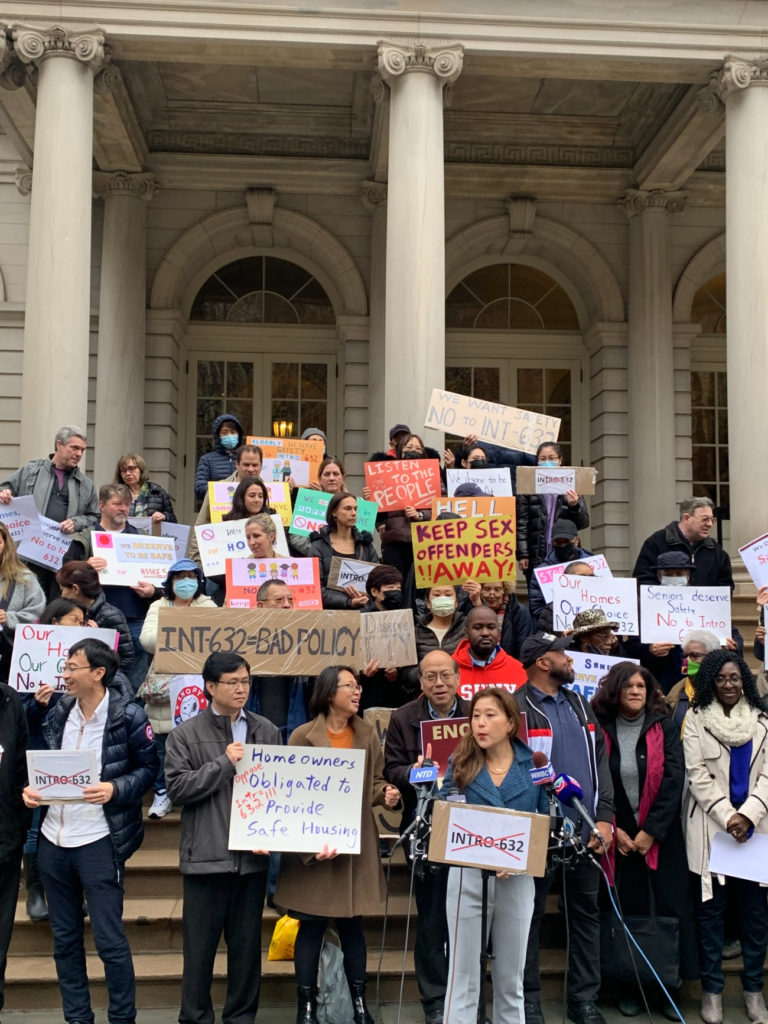
Photo by Ariel Pacheco
The following is an extended version of the story that appears in our latest print edition.
Protestors from across the five boroughs gathered on the steps of City Hall on Dec. 7 to rally against Intro. 632, a bill that, if passed, would prohibit some building owners and landlords from conducting background checks on prospective tenants at any point during the rental process. The bill has been named the “Fair Chance for Housing Act,” and its supporters say it is needed in order to give the formerly incarcerated who have served their time the opportunity to find housing, as New Yorkers continue to grapple with the ongoing affordable housing crisis.
According to the bill’s text, the Fair Chance for Housing Act would apply to people who have been convicted of a crime or who have a pending legal case against them, even if the offense in question is for a high-level crime like murder. If passed, the law would be enforced by the City’s Commission on Human Rights.
Also, according to the bill’s text and the website, fairchancehousing.org, if passed, landlords would still have the ability to vet prospective tenants, just not by way of background checks. The law would still allow landlords to interview prospective tenants, contact references, and ask for financial information. They would also still be able to check if prospective tenants were on the New York Sex Offender Registry.
The bill has faced backlash from some activist groups as well as from some city council members. Those opposed to it are concerned that, if passed, landlords would be placing tenants in unintended danger. They say without access to background checks, landlords won’t have the resources necessary to properly vet potential tenants.
“They need to kill the bill; it’s just bad legislation,” said Myrna Calderon, president of Fordham Hill Owners Corporation, where a fire broke out in early December, as reported. Located in the southwestern edge of the Fordham Manor section of The Bronx, at 1 Fordham Hill Oval, the housing complex sits on seven acres of property and comprises nine high-rise, apartment buildings consisting of 1,130 apartments.
Calderon’s fellow board member, Blandon Casenave, recently penned an op-ed in the Norwood News, on the topic of the bill. The private co-op celebrated its 40th anniversary amid much fanfare on Oct. 15, 2022, during an event which was attended by both Mayor Eric Adams and by Gov. Kathy Hochul. “New Yorkers are already not feeling safe, and people should feel safe in their homes,” added Calderon, who is also a Bronx Community Board 7 board member.
The bill, if passed, would not ban background checks on prospective tenants of public housing units operated by the New York Housing Authority (NYCHA) due to federal regulations. Meanwhile, according to the Brennan Center for Justice, there are over 2.3 million New Yorkers who have some sort of criminal record.
The bill is sponsored by City Council majority leader, Keith Powers, (D-Manhattan), and has garnered the support of 30 city council members as well as from the City’s public advocate, Jumaane Williams.

Photo by Ariel Pacheco
Advocates of the bill have argued that many felons are prone to recidivism because they lack access to the basic human right of housing. As reported, Bronx District Attorney Darcel Clark has hosted Resource Fairs in order to help the formerly incarcerated find jobs and move on with their lives, as the Bailey’s Bill to Assist with Job Opportunities passed into law.
The City Council Committee on Civil and Human Rights held an initial public hearing on the contentious housing bill on Thursday, Dec. 8. The forum allowed both sides to discuss the merits of their arguments. The hearing lasted over 5 hours. Those in favor said that providing housing to the formerly incarcerated will help reduce recidivism and in turn make New York City safer, since the formerly incarcerated are less likely to re-offend if they are granted a fair chance to acquire housing.
They also argued that the law is necessary to help combat what has become a common form of housing discrimination that they said disproportionally impacts Black and brown communities. Advocates for the bill also said that to date, landlords have been able to legally discriminate against people with criminal records.
“It is clear, and every New Yorker knows, we are facing a devastating affordable housing crisis that impacts every single community across the five boroughs,” Powers said during the hearing. “Thousands of our fellow New Yorkers are sleeping on the streets, in our shelters every night, and it is incumbent upon our City leaders to use every tool we have to tackle that crisis,” he added.
However, opponents of the bill are not sold on the belief that simply giving housing to the previously incarcerated is enough to curb recidivism. “This correlation of felons that are released not having housing, and [that] that’s tied to them not really having a stable place to stay, there’s no correlation there,” said Rachel Miller-Bradshaw, board secretary of Fordham Hill Owners Corporation, who attended the City Hall rally on Dec. 7. “The data is not proven,” she added.
Miller-Bradshaw who, as reported, is also the Democratic female State committee woman for A.D. 78, said if landlords are unable to conduct background checks, minority communities will be affected as much as anyone, as landlords will be more inclined to racially profile prospective tenants, compounding the problem of housing discrimination. “This is going to lead to more discrimination,” said Bradshaw. “Absent a criminal background check, landlords and co-op boards around the City are bound to revert to a pattern of racial profiling under the façade of protecting their current tenants, shareholders, and property.”
City Council Member Inna Verkinov (R-Brooklyn), also opposes the bill and argued that landlords deserve to know who they are housing. She also argued that tenants who may end up living next to people who have been charged with an offense will be placed in danger.

Photo by Ariel Pacheco
“This is a very dangerous bill that would harm mostly law-abiding New Yorkers,” said Verkinov, while speaking at the rally. “We cannot support a bill that would strip a property owner from their right to know if a murderer or drug dealer will move onto their property.”
In terms of ongoing dialogue on the bill, opponents are concerned their voices are being ignored. “There needs to be an inclusive and collaborative dialogue amongst all parties like tenants, residents, property owners, and developers because if not, this bill will be flawed,” said Susan Lee, a former, Democratic city council candidate for City Council District 1 which covers Manhattan’s Lower East Side and the organizer of the rally.
An earlier version of the bill failed to pass last year with 27 members of the council supporting it along with then-New York City Mayor Bill de Blasio. On that occasion, the bill in question was also introduced and sponsored by Powers.
In other housing related news, as reported, Phase II construction began at Bedford Greene supportive housing in the Bedford Park section of the Bronx on Dec. 9.
Meanwhile, later on Jan. 5, the mayor, U.S. Department of Housing and Urban Development (HUD) regional administrator, Alicka Ampry-Samuel, and interim New York City Housing Authority (NYCHA) CEO, Lisa Bova-Hiatt, announced that 36,103 apartments, across 137 NYCHA developments, have been renovated, are under construction, or are in the community planning and design process under NYCHA’s Permanent Affordability Commitment Together (PACT) program from its inception through the end of 2022.
Once complete, they said these renovations will improve quality of life for more than 76,000 NYCHA residents and address $7.2 billion in capital needs through building upgrades. They added that in 2022, the PACT program drove $2 billion in large-scale improvements for NYCHA residents in 8,531 apartments across 17 developments.
As previously reported, the PACT program transitions developments from traditional public housing assistance to what was described as a more stable, federally funded, project-based, Section 8 program, unlocking funding for designated PACT partners (in the private sector) to complete comprehensive repairs. With strong support from Adams and HUD, City officials said PACT is a key tool in the City’s strategy of preserving and upgrading New York City’s aging public housing stock. Photos of 2022 projects are available online.
“We have been clear since day one of this administration that NYCHA residents deserve the same quality of life as every New Yorker, and, in 2022, we delivered results,” said Adams. “Thanks to the PACT program, more than 76,000 New Yorkers will have safe, high-quality, affordable homes with all the tenant protections of public housing. As we continue to take major steps forward on the Public Housing Preservation Trust, we are giving residents a real menu of options to deliver much-needed repairs while always ensuring residents are at the center of the process.”
City officials said that through PACT, a total of 22 NYCHA developments have been completely revitalized, and 36 more developments are in the process of being renovated. They said an additional 79 developments are in pre-development, where NYCHA and its PACT partners collaborate with residents to design detailed rehabilitation, property management, and social service plans that meet the needs of each community and ensure they thrive for years to come.

Photo courtesy of Ed Reed/Mayoral Photography Office
City officials said the Adams administration has committed an additional $1.5 billion in capital funding for fiscal years 2023-2026 to help NYCHA continue what was described as this critical work. City officials said a breakdown of NYCHA’s PACT projects citywide, and the associated minority and women-owned business enterprise partners involved, is available online.
City officials also said the PACT program is the result of New York City’s implementation of HUD’s Rental Assistance Demonstration (RAD) program, which they said spurred construction investment at public housing authorities nationwide. The PACT program is designed to ensure that the homes of NYCHA residents are permanently affordable by maintaining public control of converted developments. They said residents who transition to the Section 8-based PACT program will continue to pay 30 percent of their adjusted gross household income towards rent, and have the right to renew their lease and call for grievance hearings. They added that NYCHA continues to monitor conditions at PACT developments after conversion.
Officials went on to say that NYCHA ensures that PACT investments respond to the lived experiences of residents and, through what was described as a robust community planning process, it engages them to learn more about each development’s needs. They said that through the PACT Resource Team, launched in 2022, resident leaders can work with independent advisors and consultants to help advocate for resident priorities and support them through the PACT planning process.
They added that Resident Review Committees analyze proposals submitted by potential PACT partner teams, conduct interviews with potential partners, and visit similarly renovated sites in each developer’s portfolio. Once that process is complete, residents rank the best proposals and make a selection, they said.
*Síle Moloney contributed to this story.




